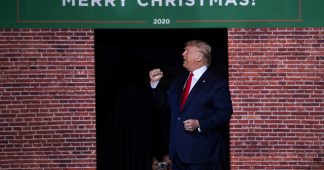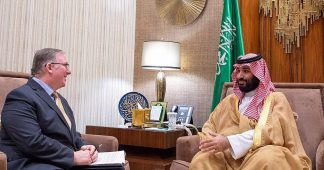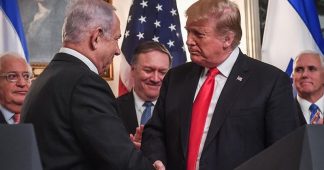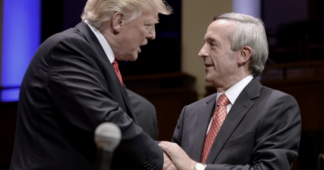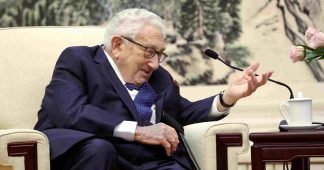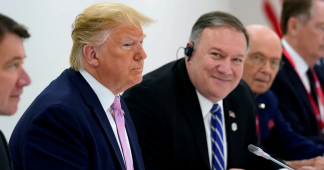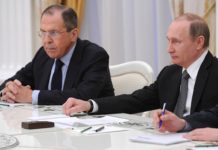By Lee Fang
“The Covid virus has been a gift from God,” began Ken Eldred. “The kingdom of God advances through a series of glorious victories, cleverly disguised as disasters.”
In response to the coronavirus pandemic, Eldred noted, millions of Americans are turning to Christ, Walmart is selling out of Bibles, and online church broadcasts have hit record numbers.
But while religiosity was growing, there have been setbacks from the disease outbreak. “Satan has been busy too,” Eldred, a major donor to evangelical and Republican causes, explained. “The virus has messed up many of our plans involving our in-person meetings with voters.”
And the rise of mail-in ballots, Eldred added, would undercut voter identification laws, which have been a pillar of GOP election strategy. “The children of the darkness put early voting into this CARES package,” he grumbled, a reference to the $400 million for election assistance programs to states included in the $2.2 trillion coronavirus relief bill.
Following a brief prayer led by Eldred, in which he declared that “we have now turned the corner on the virus” and asked God for an end to coronavirus deaths, the business of the call got started: How Christian voters can be a force to reelect Donald Trump.
The call, held in mid-April, one in a series of meetings sponsored by United in Purpose, a low-key group that has quietly become a preeminent venue for leaders on the religious right to convene. UIP was crucial in connecting Trump to evangelical leaders in 2016, and it promises to be one of the most vital weapons in Trump’s reelection arsenal this year.
At first, the effort may seem like a throwback. Participants in the group include televangelist preachers and anti-gay activists. David Barton, a historian that serves on the board of UIP, sells box sets of DVDs arguing that America was founded as a fundamentalist Christian nation with no separation of church and state.
But the group, whose supporters include major donors to conservative causes, pastors, and political operatives with decades of winning elections, is serious about serving as the tip of the spear to maintain control of the White House. UIP’s 2020 election plan — which it calls “Ziklag,” a town referenced in the Bible — is a multipronged effort to connect Trump with evangelical leaders and increase support among minority voters through appeals to faith-based messages and church outreach.
UIP did not respond to a request for comment.
And, perhaps most importantly, it plans to use data mining to identify millions of new voters and target them with cheap ads on Facebook. The pandemic, speakers noted on the call, means that they must work overtime to compensate for the effects of mail-in voting.
The unprecedented campaign would mobilize what they call “dormant evangelical and conservative Catholic voters,” with a focus on appealing to religious affiliation as a way to compensate for Trump’s relative lack of support among nonwhite voters. They expect to focus on reducing Democratic support among African Americans and older, religiously active Latino voters in particular, as they tend to hold far more culturally conservative, devout religious views than white liberals.
UIP, though not a well known group, has emerged in recent years as the essential conduit connecting the religious right to the Trump administration.
“While few Americans know about United in Purpose,” noted Katherine Stewart, the author of “The Power Worshippers,” a new book on the Christian nationalist movement and its takeover of the Republican Party, “the organization has claimed to know at least something about all or most American voters.”
The group works closely with the Family Research Council, the arch-conservative family values think tank led by Tony Perkins. The board includes former Rep. Bob McEwen, R-Ohio, an active member of the religious right through his role in convening the Council for National Policy, another Christian conservative group.
Tax disclosures show that UIP received $75,000 from the Wellspring Committee, the same mysterious nonprofit that financed the television advertising campaign to confirm Judge Brett Kavanaugh to the Supreme Court. Another major donor to UIP is Maj. Gen. Vernon B. Lewis Jr., who retired from the military to found MPRI, a defense contractor sold to L-3 Communications, and another defense consulting firm called Cypress International.
In June 2016, after Trump effectively secured the nomination, UIP hosted a high-profile meeting between then-candidate Trump and about a thousand evangelical leaders. Trump reportedly used the event to promise an array of social conservative agenda items, including lifting political restrictions on churches and a promise to appoint judges in line with religious right priorities.
Since Trump’s election, UIP has hosted regular meetings across the country to convene prominent religious leaders and donors. In 2017, UIP hosted an awards gala at the Trump International Hotel hosted by Ginni Thomas, the spouse of Justice Clarence Thomas. The following year, Vice President Mike Pence attended a UIP dinner.
Last September, members flocked to the Luxe Sunset Boulevard, a trendy Los Angeles hotel, to discuss strategy and hear from singer Pat Boone, who discussed how faith issues are influencing Hollywood. George Seay, a major GOP donor and chief executive of Annandale Capital, a global investment firm, has hosted Ziklag events for members of UIP.
UIP plans to replicate the 2016 campaign event, which was high-profile enough to generate headlines around evangelical support for Trump. But this year, the focus will be on minority outreach. During the call, UIP’s Brian Burch said that the group hopes to host an event for Trump to meet and pledge support to African American and Latino church leaders.
Burch added that UIP has already “made a series of grants to partners focused in key states” to begin efforts to reach minority faith-based voters.
Ralph Reed, a major figure in evangelical outreach for President George W. Bush, addressed the April call to provide what he called a “macro political picture” of the election ahead. In rapid succession Reed explained previous election results, comparing Trump to Mitt Romney to argue that lower turnout among African Americans in battleground Rust Belt states had been key to GOP success.
“There were 47,000 fewer black votes cast in 2016 compared to 2012 in just Milwaukee County alone,” said Reed. “In Michigan, similar outcome, Trump wins by 10,704 votes out of about 2 million cast in Michigan. And there were 36,000 fewer votes cast by African Americans in Detroit, Wayne County.”
“They are convinced that Hillary [Clinton] lost because she failed to replicate [Barack] Obama’s turnout of minority voters,” Reed added. “And they are focused on that like a laser beam as Trump is on evangelicals and pro-life Catholics.”
Marjorie Dannenfelser, who leads the Susan B. Anthony List, an anti-abortion advocacy group active in GOP elections, recently joined UIP as an ally for outreach. The group, though less well known as its pro-reproductive rights counterpart Planned Parenthood, is a major player in congressional elections. SBA List, which includes a super PAC, announced its intention to spend $52 million on the 2020 cycle in January.
During the April call, Dannenfelser emphasized the need to adapt tactics to meet the unique circumstances of the pandemic. Voters will need powerful messages to urge them to vote by mail. And across independent and Democratic voters, the abortion issue cuts across partisan lines, especially in Rust Belt states, she claimed.
“The battle for the, for the working-class pro-life voter in those battleground states is going to be key,” Dannenfelser said. SBA List, she added, has been conducting survey research on exactly how to message abortion issues. “And what we’re finding, not surprisingly, but it’s good to know, is that the born alive issue that the president has raised the profile of, has had a tremendous affect in moving persuadable voters in all of those areas in Republicans, Democrats, and Independents.”
This plan appears to dovetail with the Trump campaign’s own strategy. In January, Trump launched “Evangelicals for Trump” at King Jesus International Ministry, a largely Latino megachurch in Miami led by Pastor Guillermo Maldonado, a prominent evangelical leader.
“My administration will never stop fighting for Americans of faith,” Trump declared at the event. “We will restore the faith as the true foundation of American life.”
But the bulk of UIP’s 2020 efforts, Reed explained on the call, is grounded in the identification of new religious voters. To reach nontraditional faith-based voters, UIP is using an array of data-mining tools.
Reed claimed his “data partners” had identified 26 million key voters in battleground states, about three-fourths of whom are Facebook users. “We can reach them,” said Reed, “and it’s pennies on the dollar in terms of targeting a message compared to what the other side is going to spend on television.”
While the call didn’t specify exactly what these tools are, several members of UIP have been involved in creating technological tools for voter ID.
UIP was founded by Bill Dallas, a former model, San Francisco real estate investor, and technology entrepreneur, who became a born-again Christian while serving a prison sentence for embezzlement. One of the first businesses Dallas founded after leaving San Quentin State Prison was the Church Communication Network, a satellite and online network to broadcast church programming.
Dallas now runs Pioneer Solutions, a data-mining operation used to find and activate religious voters. In 2015, an information technology researcher stumbled upon a trove of demographic information on voters affiliated with Pioneer Solutions, including information on gun ownership and whether or not an individual had a “Bible lifestyle.” The inadvertent data leak featured information covering 191 million U.S. citizens. “We have about 200 million files, so we have pretty much the whole voting population in our database,” boasted Dallas in an interview with Christian Broadcasting Network the following year.
Brian Burch, the official with UIP who helped lead the April call, serves as president of the group CatholicVote, a group that collects potential voter information by harvesting vast troves of cellphone location data.
The controversial strategy allowed CatholicVote to use what is known as a “geofence” to target voters with frequent Catholic church attendance. The data, paired with other datasets such as voter registration, was designed to identify and motivate Mass-attending Catholics to support Republicans in the 2018 midterm elections.
In the 2020 elections, Burch has written that he intends to expand the geofencing strategy to identify millions of Catholic voters in battleground states. Burch claims that his approach has identified as many as 91,373 church-attending Catholics in Wisconsin alone who have not registered to vote.
The UIP donor who opened the April conference call, Eldred, built his wealth founding a series of technology companies through the early ’90s. Eldred cofounded Inmac, which marketed computers and electronics over catalogs, which he sold in 1996. He now serves on the board of another firm he co-founded, Epicenter, which specializes in outsourcing debt collection and information technology services to India.
Kelly Kullberg, another UIP official and the founder of a group called the American Association of Evangelicals, previously ran a network of 24 Facebook accounts with a combined 1.4 million followers designed to spread partisan misinformation. The groups, using names such as “Blacks for Trump,” “Evangelicals for Biblical Immigration,” “Veterans for Trump,” and “Nurses and Doctors for America,” were routinely filled with misinformation and hate.
A post shared across the Kullberg network of Facebook groups warned that refugee programs represented “cultural destruction and subjugation.” Another claimed Muslims are incapable of assimilation because a “normal Muslim’s loyalty is to Sharia law and supremacy.”
In a separate UIP conference call in May 2019, Kullberg discussed the need to find messages to inspire conservative voters after conferring with Reid Rutherford, a solar energy executive who has donated to the group. The pair reviewed survey research data to prepare a dossier for the 2020 election.
“Those issues include the sanctity of life versus infanticide,” Kullberg said. “What are the images that most move people? The content that drives those talking points,” she added, noting that she could push these election messages to her social media network.
Kullberg suggested driving a wedge between lesbians and the transgender community by bringing attention to the fact that trans students would gain access to women’s bathrooms and women’s scholarships. “We’ll be pointing this out,” Kullberg said. “When we were involved with exposing the anti-Semitism of Linda Sarsour, that divided the Women’s March. There are some very smart moves to weaken or soften the opposition by telling the truth.”
“Sometimes our side doesn’t really do that very well. We’re too worried about being nice,” Kullberg said. “But then we end up with infanticide. So we just realized we need to play to win this time. This is a hill worth charging.”
Kullberg claimed she could reach 80 million people with her Facebook network during the call. But her network was later shut down after it was exposed in a report by the fact-checking website Snopes.
Meanwhile, the novel coronavirus threatens to undermine their efforts and draw attention away from these conservative wedge issues.
George Barna, a pollster, has worked closely with UIP to shape its approach. In a recent memo to the group, he warned that the coronavirus pandemic has sharply reshaped American priorities going into the election, with a new focus on health care, unemployment, economic growth, and stability.
On abortion, Barna warned, “one might have expected the issue to have decreased in importance in the eyes of moderates and liberals,” while in fact, “it was conservatives who were relatively more likely to indicate a decline in importance for that issue.”
Still, UIP could serve as a potent force in the election.
“All major political operations—of all parties—now rely on big data and activist networks to sharpen their effectiveness in election campaigns,” observed Katherine Stewart, who wrote about evangelical political operations in “The Power Worshippers.”
“A key difference, however, is that United in Purpose’s voter turnout machine is at the top of a long pyramid that largely operates in the religious sphere, almost all of which is exempt from taxes and shielded from public scrutiny.”
